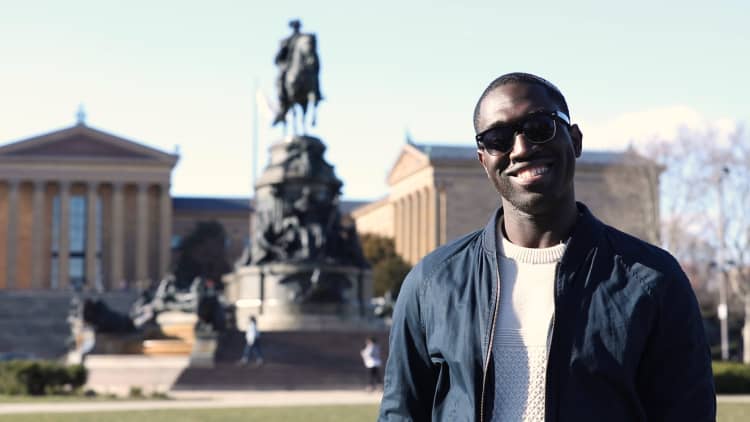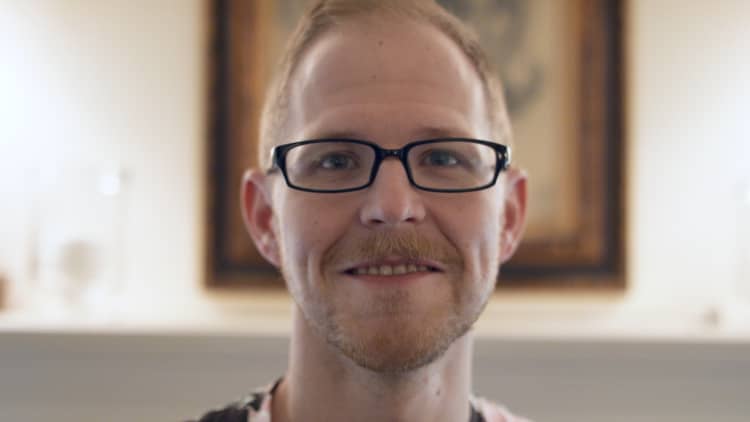This story is part of CNBC Make It's Millennial Money series, which profiles people around the world and details how they earn, spend and save their money.
Chance Wimberley admits he's made his fair share of financial mistakes over the years.
The 32-year-old accrued roughly $13,000 in credit card debt after he graduated high school. He still has around $4,500 left to pay off, including $3,400 he consolidated into a personal loan at a lower interest rate. On top of that, he has around $22,000 in federal student loan debt left from undergrad.
"I applied for as many credit cards as I possibly could, and I basically allowed myself to drown under the debt," Wimberley says. "My credit was ruined for seven years because I had no plan to get out of that debt."
Around 2013, Wimberley says he had an "ah-ha" moment about his finances when he was shopping for his first car.
"One day, I woke up and I felt miserable," he says "The debt just created more anxiety for me."
Since then, Wimberley's made a point to prioritize saving money. Today, he earns $39,000 a year as a child support case specialist for the state of Oklahoma, a job with responsibilities similar to a paralegal. He lives with his parents in the small town of Colbert, in the house in which he grew up.
In the past few years, he's managed to put away $35,000 in a savings account and $15,000 in his 401(k), despite never earning more than $40,000 a year. He's steadily decreasing his debts and plans to completely pay off his credit card balance, personal loan and car note, all of which totals around $22,000, by December.
There are lessons for everyone in his financial journey, he says. A big one: Understand how debt, including credit cards and student loans, work. Don't just sign whatever document a financial institution offers you; take the time to do your research.
I looked at debt like it was nothing, I could just pay it off. But in the past few years, I realized that debt drags people down.Chance Wimberley
"I looked at debt like it was nothing, I could just pay it off," he says. "But in the past few years, I realized that debt drags people down."
A second lesson: Don't be afraid to make changes and go after what you want. Wimberley has wanted to be a nurse since his early 20s, but in college he didn't think he'd be able to handle the coursework. Instead of pursuing his passion, he played it safe and studied history and political science at Southeastern Oklahoma State University. His student loan payments, currently deferred because of Covid-19, are monthly reminders of a path not taken. "I didn't want to challenge myself because I was scared," he says.
That's all changing soon. In January, Wimberley's going back to school to get his master's degree and become a nurse practitioner. It's a big life change, but after overcoming a health scare and doing the work to build up his confidence over the past few years, he's ready to take on the challenge.
"When the pandemic hit, it made me realize that life is too short and I need to pursue my dreams while I still have the chance," he says.
Financial lessons learned early
Wimberley says he is sometimes "embarrassed" to still live with his parents. But given his monthly income, he sees it as a choice between "ramen noodles and an apartment" or living more comfortably at home.
For him, it was an easy decision. He contributes $100 per month toward his parents' mortgage and handles his groceries and some of the home's maintenance costs.
He's close with his parents, especially his mother. The family didn't have a lot of money when Wimberley was growing up. His mother lost her job when he was in kindergarten, and his father is a disabled veteran with dementia. Some months, the family of four lived on less than $700. But as a child, none of that bothered him.
"For a lot of people, money is of the utmost importance. But as a kid, all I remember is my sister and I enjoying our life, and my mom and my dad giving me the love that any parent should give," he says. "Regardless of how much money we had or didn't have, I knew they would love me for the rest of my life."
Things only got more difficult as Wimberley got older. His dad developed a gambling addiction and started missing housing payments. The family's home was foreclosed on four different times, and, after high school, Wimberley took on the responsibility of ensuring all of the bills were paid, including occasionally paying the mortgage with money he earned as a medical assistant.
"I had to take charge of their money on top of taking charge of mine," Wimberley says. "It's why I save so much money, because [my dad] didn't."
Wimberley still manages his parents' finances, and these days also helps his mom with his dad's care. But once he finishes nursing school in 2023, he plans to move out. He's had visions of living in L.A. since he visited there in 2018. As a gay man, Wimberley thinks it would be a more accepting place — and provide a larger dating pool than tiny Colbert.
"It would be nice to live in an area where I can walk down the road with my partner and not feel like people are staring at us," he says.
But it will be hard to leave Colbert. Wimberley and his mother's family are members of the Chickasaw Nation, and he takes pride in his heritage, arranging reunions and attending genealogy conferences.
"My family has lived here in this little city for over 160 years," he says. "I'm very proud of my Native American heritage."
How he budgets his money
Here's a look at how Wimberley spends his money as of October 2020.
- Savings: $1,000
- Transportation: $504 for his car payment ($350), gas ($60) and insurance ($94)
- Debt repayment: $275 for his credit card ($100) and personal loan ($175)
- Investments: $175 into his 401(k). His job matches this amount.
- Food: $160 for groceries. His parents also pay for some of his food.
- Shopping: $130
- Rent: $100 toward his parents' mortgage
- Phone: $75
- Subscriptions: $29 for Amazon Prime, Netflix and Spotify
Though he could easily pay off much of his debt with his current savings, Wimberley says fear has stopped him. But come December, he plans to use his savings to pay off his credit card debt, personal loan and car note. He wants a fresh start for nursing school so he can focus on his dream.
"For the past five or six years, I've been hoarding money, and I think it's due to my upbringing, of possibly not having money," he says. "But now, with me being accepted into this nursing program, I have hope. I can do anything now."
His student loan payments are currently deferred until he graduates from nursing school. Wimberley will fund school through a combination of scholarships and his savings. "I won't take out loans unless it's absolutely necessary," he says.
I've just learned to live well below what I make. My philosophy is, I never know when I will need it, so I should probably save it.Chance Wimberley
Since Wimberley started getting his debt under control, he says it's actually been easy to cut out superfluous spending and focus on the bigger picture. As long as he has his family and friends, he's realized he doesn't need much else to be happy.
"I've just learned to live well below what I make," he says. "My philosophy is, I never know when I will need it, so I should probably save it."
Looking to the future
Wimberley is planning for his future as best as he can during the coronavirus pandemic. He started traveling around the U.S. over the past two years, and that's something he hopes to get back to soon. First stop: Austin, Texas. Then, New York. "It's the only big city I haven't visited in the United States," he says.
In the meantime, he will continue to be active in the local Democratic party and serve on the election board in his county. He encourages everyone, regardless of party, to exercise their right to vote in the presidential election on Nov. 3. "I feel it's very crucial that people let their voice be heard," he says.
Wimberley doesn't aspire to be a millionaire. His biggest goal is to be completely debt-free within a year or two of graduating from nursing school. From there, he wants to do right by his patients, and find a partner.
"I want to live to enjoy life and what it has to offer," he says. "I don't want to wake up every morning knowing that I owe someone else thousands of dollars."
What's your budget breakdown? Share your story with us for a chance to be featured in a future installment.
Check out: How a 30-year-old physical therapist with over $230,000 in student loan debt spends her money
Don't miss: Chase Sapphire Preferred is offering a massive 80,000-point bonus for a limited time




